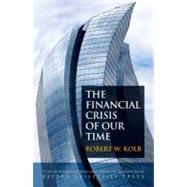The Financial Crisis of Our Time
, by Kolb, Robert W.- ISBN: 9780199730551 | 0199730555
- Cover: Hardcover
- Copyright: 1/28/2011
The Financial Crisis of Our Time investigates the mechanism by which the housing industry came into crisis beginning in 2006. It does not claim this to be the cause of the recent financial crisis-it argues that no single such cause can be identified. It posits that the events leading up to the recent crisis cannot be understood without first comprehending what happened in the housing industry, as residential real estate prices fell, threatened the world's largest and most respected financial institutions beginning in 2007 and confronted the real economy with serious problems and even disaster in 2008. The book begins by analyzing how the housing finance system developed in 1990 into a finance model that confronted market participants with an array of new incentives. Borrowers, mortgage brokers, appraisers, loan originators, securitizers, due diligence firms, rating agencies, ultimate investors, legislators, and bureaucrats all fit together to form an intricate mechanism-a "clockwork of perverse incentives." The dangerous feature of this system was that by simply responding to the incentives before them and acting out of self-interest, the various participants were contributing into an elaborate mechanism that led to disaster. Unlike a clock, there was no overall architect or designer for the system of housing finance. It evolved from individuals' responses to legal incentives and market forces. Only by understanding the incentives in the originate-to-distribute mortgage cycle can we understand the actors' behavior and ultimate effect.






